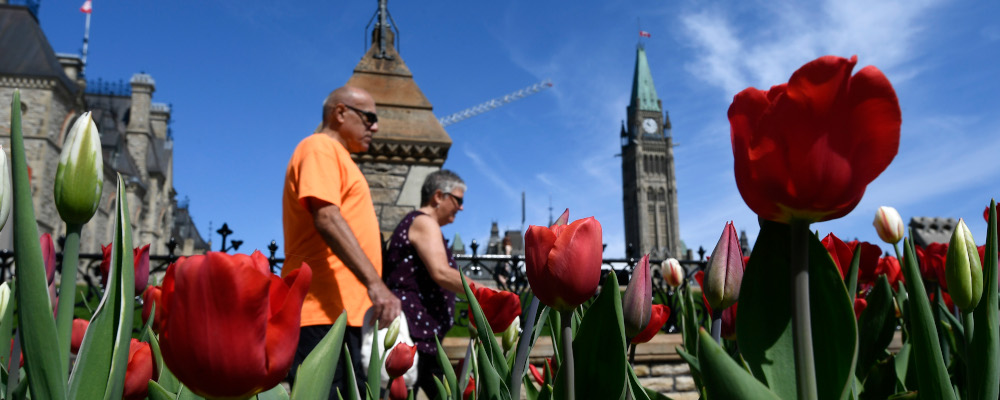Last month’s Munk Debate considered the merits of liberalism. Opening statements subsequently published in The Hub by George Will and Sohrab Ahmari offer insight into the crisis of liberalism and what it might do to persevere.
There might be no one better than George Will to defend liberal conservatism, but putting him against the anti-liberalism of Sohrab Ahmari shows why there has to be more to liberalism than the bits that conservatives are most comfortable with. To be compelling in the face of serious challenges, liberalism should come with a commitment to freedom and equality.
Will’s worldview has become more liberal over the years (something Ahmari exploits to amusing effect) but his attachment to conservatism shows in his defence of hierarchy, so long as it’s the right sort—a hierarchy that arises from merit and markets.
Liberalism indeed defends commercial society, and it’s just true that the market rewards (and should reward) rarer skills or more in-demand work at a higher rate than it does jobs that can be done by more people or with less training, and this leads to both material inequality and power hierarchies. But the outcome of a good system isn’t therefore good itself, and the conflation of political and economic equality is dangerous and undermines the case for liberalism.
Ahmari, in his case against liberalism, demonstrates the importance of political equality when he omits it. Instead, he claims that our cherished political values are older than liberalism and so we can hold onto them without holding onto liberalism.
But that’s wrong. Political equality is a key innovation of liberalism. This is precisely why liberals should explain and emphasize our commitment to equality, rather than reassuring listeners that liberalism can produce a justified hierarchy. Greece (especially Athens) is a famous example of early self-government, but Athenian democracy excluded most Athenians. Roman “impartial administration” applied only to Roman citizens: the rulers of subjects and slaves. The kernels of tolerance, due process, impartial administration, and self-government may not have emerged with liberalism, but it was liberalism that extended these important political institutions to everyone.
It’s in post-liberals’ interest to let us forget this. It’s frustrating when liberals neglect it.
The liberal tradition gives us the tools to apply healthy skepticism of hierarchy, regardless of how it comes about. Adam Smith, the 18th-century Scottish philosopher who wrote The Wealth of Nations, made the then-radical claim that the differences between a street porter (a manual labourer) and a philosopher (an academic, like Smith himself) were the result not of natural differences between people but of their education, work, and experiences. In other words, Smith believed that people are born equal, and hierarchies emerge through socially beneficial work—as Will points out.
But, as McGill’s Ryan Griffiths lays out in a recent lecture, Smith did not cheerily defend the resulting social hierarchy. Instead, Smith observed that people tend to elevate and follow the rich and powerful and to turn away and distance themselves from the poor and miserable. The fact that people defer to and follow power can be socially useful—some deference to authority is necessary for social and political stability. But Smith cautioned that these hierarchies are “the great and most universal cause of the corruption of our moral sentiments.”
We sympathize more easily with, and so react more strongly to, news of the misfortunes of politicians and celebrities, while we find it easy to ignore or even excuse the tragedies afflicting the miserable. Hierarchies challenge our ability to feel equally for one another, and so challenge feelings about equal moral worth. Liberalism should insist that hierarchies, though unavoidable and sometimes even useful, are always dangerous to the foundational liberal principle of political equality.
This is why it matters how Will defends meritocracy. A sort of meritocracy in the market is defended by liberals. A meritocracy to determine our political voice or our moral worth would be monstrous.
No one familiar with Will’s work thinks that he would argue too strongly with any of the above—he argues for churn and the dissolution of old orders. But a commitment to political equality is inconvenient for those who want an automatic fit between conservatism and liberalism.
Conservatives point to the liberal promises made in the American founding and through Canadian law and claim that the purpose of American conservatism is to preserve liberalism. But those promises were never kept. They have always been aspirational and inherently dynamic, not something we can conserve or get back to.
Nonetheless, based on the idea that liberalism needs to be conserved rather than pursued, many liberals have positioned themselves with conservatives against contemporary movements for improving political equality. These liberals confuse concern with group identities for rejection of the importance of the individual.
McGill’s Jacob Levy identifies two strains of liberalism: rationalist liberalism, which emphasizes a uniform guarantee of personal liberty, and pluralist liberalism, which recognizes the freedom of individuals to form groups and defend the rights of their groups within a liberal society. The rationalist liberal urge to protect individuals from the tyranny of groups (for example, trying to free religious observers from conservative dress requirements) is always in tension with the pluralist liberal urge to protect groups’ abilities to govern themselves (the freedom to dress following religious rules).

Liberalism’s critics, especially post-liberals like Ahmari, act as though there is only rationalist liberalism defending atomistic individuals from the demands of their community to claim that liberalism has no concern with neutrality between groups or communities. Pluralist liberalism’s tension with rationalist liberalism answers their concerns and provides a corrective force within liberalism to oppose the potential for rationalist overreach. It can only do this if liberalism recognizes the political importance of groups.
Among politically important groups are those formed by people based on shared identities. Politics has often not been identity-neutral in effect, intent, or even on its face, and differential treatment can compound over time, entrenching prejudice and disadvantages. The political Left believes this has most importantly disadvantaged racialized and LGBTQ+ communities, while the political Right believes it disadvantages those living traditional lifestyles and religious believers.
Regardless of which side any particular liberal is inclined to sympathize with, that liberal might believe this never should have happened, but to act as though it never did happen undermines the political corrective to government-backed injustice of disadvantaged identity-based communities mobilizing politically for improvement. Liberalism has to understand the importance of identities and groups to be politically relevant. Liberalism has to be politically relevant to be compelling.
Rather than emphasize the battle for freedom and against inequality that sets liberalism apart and lights a flame in the heart of citizens demanding to be counted, too many liberals have rejected the validity of group membership as a politically salient or unifying issue. Having washed their hands of these groups, liberals then condemn identity-based movements for lacking sufficiently recognizable liberal politics.
Rather than making “the building of a free society once more an intellectual adventure, a deed of courage”, these liberals sing the praises of boring politics.
It is the promise of not just freedom, but political equality that makes liberalism an exciting and inspiring political philosophy. Together with dynamic markets, it is the spread of political equality that dissolves hierarchies and democratizes power. This is where the work of defending liberalism needs to happen if it’s going to stand against other “exciting” political ideologies that promise to answer all of life’s questions.
Recommended for You

‘Our role is to ask uncomfortable questions’: The Full Press on why transgender issues are the third rail of Canadian journalism

Michael Kaumeyer: Polite decline: Canada’s aversion to being our best is holding us back

Howard Anglin: Lament for a Lament

‘A place where anybody, from anywhere, can do anything’: The Hub celebrates Canada Day




